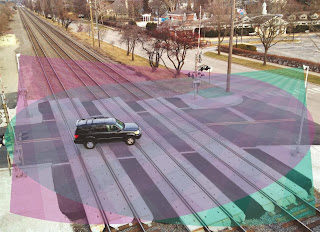Systems and methods for redundant vehicle detection at highway-rail grade crossings
| Inventors: | Hilleary; Thomas N. (Kansas City, MO) | ||||||||||
|---|---|---|---|---|---|---|---|---|---|---|---|
| Applicant: |
| ||||||||||
| Assignee: | Bystep, LLC (Kansas City, MO) | ||||||||||
| Appl. No.: | 13/103,625 | ||||||||||
| Filed: | May 9, 2010 |
The Wavetronix Matrix Radar was adapted for use at four-quadrant gate railroad crossings for the purpose of influencing exit gate behavior upon the detection of vehicles, as an alternative to buried inductive loops. Two radar devices were utilized, operating collaboratively, in order to realize a fully redundant system.
Performance variables including vehicle size and location, vehicle occlusion, and radar positioning were evaluated, along with sensitivity to rain, snow, and other environmental conditions.
Recommendations for utilization of the radars in conjunction with popular crossing warning system controllers are provided. Also included is a means for detecting vehicles that are stopped, stored, or deliberately placed in the crossing island, and rapidly communicating that information across cellular, PTC, ITCS, and ACSES, and other data networks.
AREMA Report
Executive Summary
The
development and testing of a radar-based means of detecting vehicle presenceat
railroad crossings showed improvements in the areas of performance,
reliability, safety, and life-cycle cost over the industry’s standard use of inductive
loop vehicle detectors.A comprehensive series of validation tests contrasted
the dual microwave radar system with the performance of inductive loop arrays. Tests
that evaluated mounting location, vehicle size and location, environmental and meteorological
performance, and failsafe scenarios demonstrated the dual-radar system’s performance
to be equal or superior to that of strategically-placed inductive loops in
actual railroad crossing installations.
Over four
months of testing involving more than 120,000 vehicles showed no missed
detection events for either the loop system or the dual radar system.False
detections by the loop system occurred 68 times(0.057%) while false detections
by the radar system occurred 27 times(0.022%). For the purpose of providing an
exit path for potentially trapped vehicles in four quadrant gate crossings, a
false detection is generally considered to be a ‘right-side’ failure –causing
exit gates to ascend to the failsafe, raised position.
UK Implementing Radar Controlled Grade Crossings
The Office of Rail Regulation has announced how it is going to spend £21 billion on the rail network over the next five years. Targets include an improvement in punctuality and more money for upgrading dangerous level crossings. One
crossing which has already been upgraded, in Ormskirk, Lancashire, was
the site of a near miss in 2012, when the crossing was manned. Now a new obstacle detection system has been installed which uses radar. Although this technology is common in Europe, it is new in the UK. It will be quite costly, with each crossing costing over £1 million.


No comments:
Post a Comment